The gender & age of moviegoers
4 March 2011
Mark Harris has a piece in GQ right now that offers a dark explanation of why Hollywood makes such a lot of garbage — you know, all those sequels and superheroes — but I’ve gotten stuck on a passage midway through. Hollywood makes movies for one group of viewers: men under 25, he explains. Moreover:
In Hollywood [if you] have a vagina, you’re pretty much out of luck, because women, in studio thinking, are considered a niche audience that, except when Sandra Bullock reads a script or Nicholas Sparks writes a novel, generally isn’t worth taking the time to figure out. And if you were born before 1985 … well, it is my sad duty to inform you that in the eyes of Hollywood, you are one of what the kids on the Internet call “the olds.” I know—you thought you were one of the kids on the Internet. Not to the studios, which have realized that the closer you get to (or the farther you get from) your thirtieth birthday, the more likely you are to develop things like taste and discernment, which render you such an exhausting proposition in terms of selling a movie that, well, you might as well have a vagina.
In short, as writer-producer Vince Gilligan explains, “Hollywood has become like Logan’s Run: You turn 30, and they kill you.”
Except hang on, that doesn’t make sense vis-à-vis the actual numbers of moviegoers. As the blogger Melissa Silverstein shows in her roundup at Women & Hollywood, women buy tickets and attend films in exactly the same numbers as men, and it’s viewers over 25 who see vastly more movies — over 60%. In short, Hollywood is still putting all its eggs into that basket made up of 23% of the moviegoers between the ages of 12 and 24. Hell, it’d make more sense to market to the whopping 15% of the moviegoing populace between the ages of 2 and 11 — and to their parents.
Nor does it make sense when you look at the trends with big-budget cable TV series. Suddenly it’s not just HBO making quality series; it’s also TNT and AMC and USA (and Showtime, natch), all of which seem to be targeting a population in its 30s & 40s. From Justified to The Closer, Saving Grace, Mad Men, and Nurse Jackie, these shows feature a surprising number of great women actors in their 40s, for gods’ sake. Hollywood could sell more tickets to me if my choices weren’t limited to the appalling The Green Hornet and Justin Bieber Never Say Never; but now that you mention it, I’d rather stay home with Edie Falco.
Oh, did I forget that Hollywood has thrown to us ladies movies like Just Go With It (the Jennifer Aniston vehicle) and No Strings Attached (Natalie Portman’s poorly-considered followup to Black Swan)? Can you feel your intelligence being insulted?
A long time ago I remember hearing a news story about the brilliance of McDonald’s, which varied its menu to suit local populations. In Hong Kong it sells fried rice; in India it sells the McAloo Tikki burger; in Turkey you can get a Kofteburger. McDONALD’S DIVERSIFIES TO SELL FOOD. Why can’t Hollywood?
Four badly under-used female actors
14 August 2010
This is a wholly random collection, as you’ll see — aren’t they always? It’s partly inspired by my wish to see a wider range of female parts get handed out, but these actors have stuck in my mind for ages, and I think Hollywood needs a nudge.
- Shareeka Epps. She played the
 watchful, thoughtful middle-school kid in “Half Nelson” (2006) alternately inspired and disturbed by her self-immolating history teacher (Ryan Gosling). I can’t imagine what it must have taken for a 15- or 16-year-old to step up to Gosling in that film, but she did — earning piles of awards nominations and several wins, including Breakthrough Performance from the Gotham Awards. I’ve been watching and waiting for more from her ever since — but she’s suffered like so many young black actors by a Hollywood single-mindedly focused on white dudes.
watchful, thoughtful middle-school kid in “Half Nelson” (2006) alternately inspired and disturbed by her self-immolating history teacher (Ryan Gosling). I can’t imagine what it must have taken for a 15- or 16-year-old to step up to Gosling in that film, but she did — earning piles of awards nominations and several wins, including Breakthrough Performance from the Gotham Awards. I’ve been watching and waiting for more from her ever since — but she’s suffered like so many young black actors by a Hollywood single-mindedly focused on white dudes. - Michelle Forbes. It’s not just the
 time she put in earning paychecks as Ro Laren in the old “Star Trek: The Next Generation” (or her utterly delightful turns in “Battlestar Gallactica” and as the psychopathic Maryann on “True Blood”), although any one of those performances might be enough for me to want more of this willowy, wicked-eyed, sharp-tongued, iconoclastic actor. But it was “In Treatment” that nailed it, as the miserable wife of the psychotherapist Gabriel Byrne — her exasperating sessions with a man who’s simultaneously too smart and too deluded to change his destructive path to show her he cares. Of everyone on my list, Forbes has gotten the most work during her career; and she might be perfectly content with her wide range of parts. But I want more.
time she put in earning paychecks as Ro Laren in the old “Star Trek: The Next Generation” (or her utterly delightful turns in “Battlestar Gallactica” and as the psychopathic Maryann on “True Blood”), although any one of those performances might be enough for me to want more of this willowy, wicked-eyed, sharp-tongued, iconoclastic actor. But it was “In Treatment” that nailed it, as the miserable wife of the psychotherapist Gabriel Byrne — her exasperating sessions with a man who’s simultaneously too smart and too deluded to change his destructive path to show her he cares. Of everyone on my list, Forbes has gotten the most work during her career; and she might be perfectly content with her wide range of parts. But I want more. - Sandi McCree. I’ve found myself several
 times defending her performance in “The Wire” as Namond Brice’s mother — some saw De’Londa as so hard-edged as to be a stereotype of the ghetto woman. If anything, it was brave; but in truth I thought she did some of the best, quiet work of season 4. De’Londa was dedicated to playing a particular role as the wife of a good soldier in Baltimore’s drug wars, and this wasn’t an easy role. While her husband had sacrificed himself and was ticking away the years of a life sentence in prison on behalf of his bosses, De’Londa was left to 1) keep her husband’s memory alive in the streets; 2) enjoy the lifelong financial payouts from the bosses; and 3) raise their son to be just like his father. Except that the payouts ended, and Namond was sort of a wuss. No wonder De’Londa was angry a lot of the time. I loved her then and want more of these unexpected portrayals of black women onscreen.
times defending her performance in “The Wire” as Namond Brice’s mother — some saw De’Londa as so hard-edged as to be a stereotype of the ghetto woman. If anything, it was brave; but in truth I thought she did some of the best, quiet work of season 4. De’Londa was dedicated to playing a particular role as the wife of a good soldier in Baltimore’s drug wars, and this wasn’t an easy role. While her husband had sacrificed himself and was ticking away the years of a life sentence in prison on behalf of his bosses, De’Londa was left to 1) keep her husband’s memory alive in the streets; 2) enjoy the lifelong financial payouts from the bosses; and 3) raise their son to be just like his father. Except that the payouts ended, and Namond was sort of a wuss. No wonder De’Londa was angry a lot of the time. I loved her then and want more of these unexpected portrayals of black women onscreen. - Molly Shannon. When she was on “Saturday
 Night Live” she was given a lot of the broadest comedic parts, like that of a spastic cheerleader; and she’s still used in bit parts for her knack for that style of sketch comedy. But a few years ago she showed in “Year of the Dog” (2007) that she’s really good in bittersweet, subtly funny parts as well. So now, whenever I catch her making a brief appearance — on “30 Rock” as Jack Donaghy’s sister; on “Glee” as a nutso teacher; and on SNL’s massive Mother’s Day/Betty White/women’s reunion extravaganza — I keep seeing the fine actor in her being blunted by the writers’ short-sighted demand for broad comedy. There’s been an odd conversation in the media during the last year about funny women — at one point, Margaret Cho suggested that the funniest women were gender bending and/or gay, while others rationalized the lack of women writers on TV comedies by suggesting that women just aren’t as funny as men (I’m calling out Stephen Metcalf of Slate’s Culture Gabfest for an uncharacteristically bad moment). Then there was the kerfuffle over “The Daily Show” and its dearth of female correspondants. Anyway — my point is that there are lots of funny women and a few with the subtle talents of Molly Shannon, and that they’re under-used.
Night Live” she was given a lot of the broadest comedic parts, like that of a spastic cheerleader; and she’s still used in bit parts for her knack for that style of sketch comedy. But a few years ago she showed in “Year of the Dog” (2007) that she’s really good in bittersweet, subtly funny parts as well. So now, whenever I catch her making a brief appearance — on “30 Rock” as Jack Donaghy’s sister; on “Glee” as a nutso teacher; and on SNL’s massive Mother’s Day/Betty White/women’s reunion extravaganza — I keep seeing the fine actor in her being blunted by the writers’ short-sighted demand for broad comedy. There’s been an odd conversation in the media during the last year about funny women — at one point, Margaret Cho suggested that the funniest women were gender bending and/or gay, while others rationalized the lack of women writers on TV comedies by suggesting that women just aren’t as funny as men (I’m calling out Stephen Metcalf of Slate’s Culture Gabfest for an uncharacteristically bad moment). Then there was the kerfuffle over “The Daily Show” and its dearth of female correspondants. Anyway — my point is that there are lots of funny women and a few with the subtle talents of Molly Shannon, and that they’re under-used.
As soon as I post this I’ll probably think of more people — but I’m racing to the airport for one last short summer trip before the semester takes over my life. Bon voyage, all!






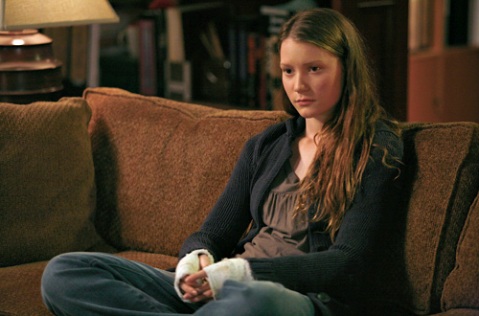
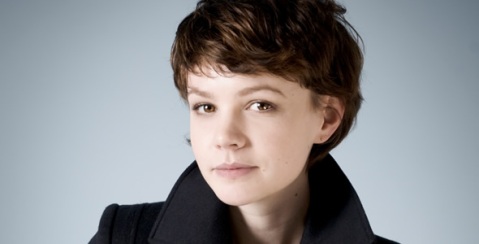
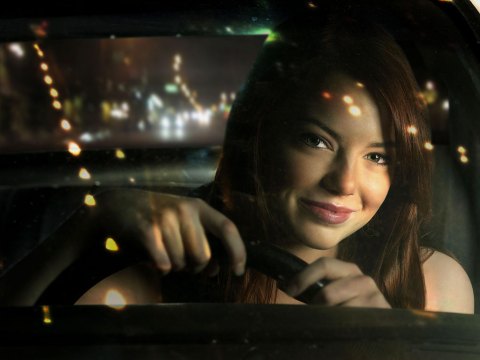
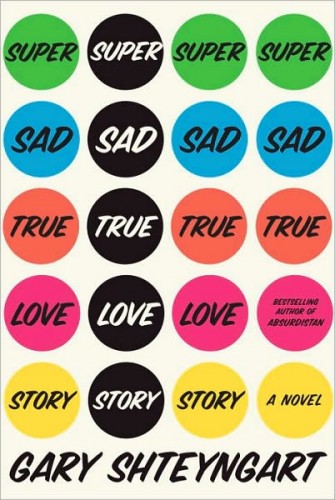
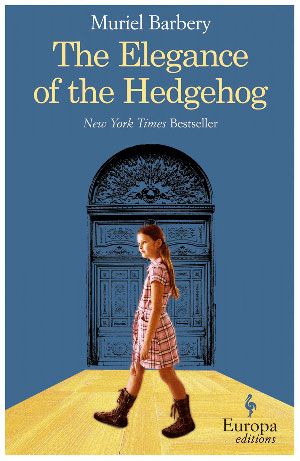 I’ve plunged myself into Muriel Barbery’s wonderful novel, The Elegance of the Hedgehog, which moves back and forth between the interior monologues of two brilliant women: the autodidact Renée, who hides behind her mask as an unkempt, sullen concierge in an elegant Paris apartment building; and Paloma, the precociously intelligent 12-year-old who lives upstairs and despises the pretentions of her family, teachers, and classmates. They seem to be on a path to discover one another — but I’m at the point in the novel when I’m so enjoying just listening to them think out loud that I’m not sure I care whether the narrative goes anywhere (Paloma has a diatribe about why grammar is about accessing the beauty of language that’s so wonderful I’m thinking of plagiarizing it for use in my classes).
I’ve plunged myself into Muriel Barbery’s wonderful novel, The Elegance of the Hedgehog, which moves back and forth between the interior monologues of two brilliant women: the autodidact Renée, who hides behind her mask as an unkempt, sullen concierge in an elegant Paris apartment building; and Paloma, the precociously intelligent 12-year-old who lives upstairs and despises the pretentions of her family, teachers, and classmates. They seem to be on a path to discover one another — but I’m at the point in the novel when I’m so enjoying just listening to them think out loud that I’m not sure I care whether the narrative goes anywhere (Paloma has a diatribe about why grammar is about accessing the beauty of language that’s so wonderful I’m thinking of plagiarizing it for use in my classes).



